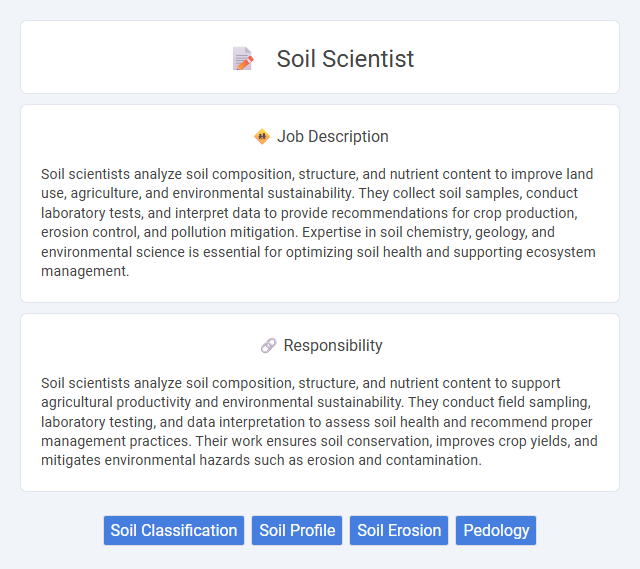
Soil scientists analyze soil composition, structure, and nutrient content to improve land use, agriculture, and environmental sustainability. They collect soil samples, conduct laboratory tests, and interpret data to provide recommendations for crop production, erosion control, and pollution mitigation. Expertise in soil chemistry, geology, and environmental science is essential for optimizing soil health and supporting ecosystem management.
Individuals with a strong interest in biology, environmental science, and fieldwork are likely to find a career as a soil scientist suitable. People who enjoy analyzing data, working outdoors in diverse conditions, and solving complex ecological problems probably adapt well to this role. Those who prefer stationary office jobs or minimal physical activity may face challenges in fully engaging with the demands of soil science careers.
Qualification
Soil scientists typically require a bachelor's degree in soil science, environmental science, geology, or a related field, with many positions demanding advanced degrees like a master's or PhD for research roles. Proficiency in soil analysis techniques, GIS technology, and knowledge of soil chemistry and physics are essential qualifications. Certifications such as the Certified Professional Soil Scientist (CPSS) credential can enhance job prospects and credibility within the field.
Responsibility
Soil scientists analyze soil composition, structure, and nutrient content to support agricultural productivity and environmental sustainability. They conduct field sampling, laboratory testing, and data interpretation to assess soil health and recommend proper management practices. Their work ensures soil conservation, improves crop yields, and mitigates environmental hazards such as erosion and contamination.
Benefit
Soil scientists likely enjoy a range of benefits, including opportunities for impactful environmental research and contribution to sustainable agriculture practices. They probably receive competitive salaries and may experience job security due to the growing emphasis on land conservation and climate change mitigation. Benefits may also include fieldwork variety and collaboration with multidisciplinary teams, enhancing professional growth and job satisfaction.
Challenge
Soil scientists probably face challenges related to analyzing complex soil compositions and understanding their impact on agriculture and the environment. They likely encounter difficulties in predicting soil behavior under changing climatic conditions and managing soil degradation. Adapting to new technologies and integrating interdisciplinary data might also present ongoing challenges in this profession.
Career Advancement
Soil scientists can advance their careers by gaining expertise in specialized fields such as soil chemistry, environmental consulting, or agricultural technology. Pursuing advanced degrees like a Master's or Ph.D. in Soil Science or related disciplines enhances opportunities for research positions, academic roles, and leadership in government agencies. Professional certifications and experience with GIS technology further increase job prospects and salary potential in both public and private sectors.
Key Terms
Soil Classification
Soil scientists specializing in soil classification analyze soil properties to categorize soils based on texture, structure, composition, and nutrient content, facilitating effective land use planning and agricultural practices. They employ techniques such as soil sampling, laboratory testing, and geospatial mapping to identify soil horizons and classify soils according to established systems like the USDA Soil Taxonomy or World Reference Base for Soil Resources (WRB). Accurate soil classification supports environmental management, crop selection, and sustainable soil conservation strategies across diverse ecosystems.
Soil Profile
Soil scientists specializing in soil profiles analyze the distinct layers, or horizons, within a soil sample to determine composition, texture, and nutrient content critical for agriculture and environmental management. Understanding soil profiles enables precise recommendations for crop selection, irrigation practices, and erosion prevention by assessing organic matter and mineral distribution. Advanced techniques such as horizon description, color analysis, and moisture measurement are essential for accurate soil classification and land-use planning.
Soil Erosion
Soil scientists specializing in soil erosion study the processes that lead to the degradation of soil surfaces due to water, wind, and human activities, aiming to develop effective erosion control methods. They analyze soil composition, slope gradients, vegetation cover, and climatic factors to assess erosion risks and implement sustainable land management practices. Utilizing tools such as geographic information systems (GIS) and erosion modeling software, these experts contribute to preserving soil health and preventing environmental damage.
Pedology
Soil scientists specializing in pedology analyze soil formation, classification, and mapping to understand soil properties and processes. They conduct field surveys and laboratory tests to evaluate soil composition, structure, and fertility, aiding in sustainable land management and agricultural productivity. Expertise in pedology supports environmental conservation efforts by assessing soil health and mitigating erosion and degradation.
 kuljobs.com
kuljobs.com